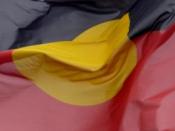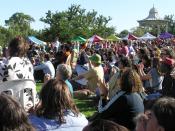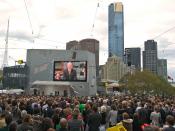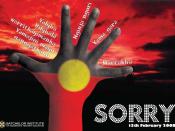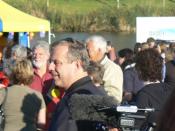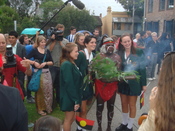The Australian Prime Minister apologized to the Aboriginal population for Stolen Generations on 13 February (Lewis 2008). Stolen Generation, roughly, can be defined as the forcible removal of Aboriginal children from their families and homes (Victorian Aboriginal Legal Service Fact Sheets 2003). Some people resolutely oppose apology. They believe that since Stolen Generation is not the directly responsible, apology is not necessary (Kanck 2000). However, we argue that Stolen Generation was cultural fenocide, violotion of basic rights damage of health and it affects from past to present day. The goverment absolutely should appologize for the damage they have done. The purpose of this essay is to argue whether the current Australian Government should officially apologize to the Aboriginal people for the past wrongs.
For one thing, the Stolen Generation was associated with violation Aboriginal rights. The Aboriginal children, who should have been taken good care and enjoyed the love from their families.
Instead they were separated from the places they belong and were moved to foster families and institutions. When the non-Aboriginal children were playing and enjoying their childhoods. Instead, separated children were subjected to work. Furthermore, the Government responded to complaints and resistance of separation either by coercion, force or ignore. The Government refused to return their children, although these children were not orphaned and their parents wanted them, as well (Wilson 1997). Obviously, Aboriginal rights failed to be respected during separation when all of these rights have been enjoyed by all other Australians.
As a result of separation practice, health problem have been created. It is particular true; children suffered ill-treatment from non-Aboriginal strangers and sexually assaulted, abused were also frequent during the separation. It is damage for their health that faced with physiological and physical abuse. Aboriginal and Torres Strait Islander CommissionÃÂs recent research has shown that ÃÂthe practices of removing Aboriginal children from their families and communities had directly affected one in ten Aboriginal Australians. The Royal Commission Inquiry into Aboriginal Deaths in custody found that some 50 percent of those who died in custody had been separated as children.ÃÂ(Wilson 1997)ÃÂWhat is the one common thing that affects everybody that has been through removal?ÃÂÃÂI suppose loss of identity.ÃÂ(Wilson 1997, p.39)The Aboriginal children, after being taken away from their own land and moved to places where they did not belong and where the, they grew up away from families, communities. They have lost contact with their own language and culture. As a result of these polices, their identity as an Aboriginal person and identity had been destroyed (Victorian Aboriginal Legal Service Fact Sheets 2003). It is really hurts to think about that you grow up but you don not know who you are and those who also belong in your land can not even remember or were told you existed there.
Apart from the damage in the past, the impacts of forcible removal are still being felt deeply today. Although removed people have died, the irreparable harm caused by mental and physical trauma still exists and may be continuing passed from one generation to the next. For instance, when the separated children become adults, they had ability to looking for their families and communities. Unfortunately, one of the serious consequences of forcible removal is unknowing who their family is and fear of incest may be caused. This fear may prevent them from having children, in turn affects the children of the children, resulting in a continuing cycle (Wilson 1997, p.168).
However, somebody still hold an opinion for not apologizing. They believe that it is not necessary to say ÃÂsorryÃÂ for something they did not do directly. `We didn't inflict the harm' they argued and claim that if you say ÃÂsorryÃÂ means that you are admitting some guilt that you did. Say `Sorry' means that the damage was done to Aboriginal population was on purpose. ÃÂTo say `Sorry' acknowledges that something was not done properlyÃÂ(Kanck 2000).
In conclusion, since Stolen Generation has indeed brought Aboriginal population damage that did and do affect their life and influenced their culture, fundamental human rights and health, no matter who did this practice directly, the government should do apology to the way they have been treated with out doubt.
Reference listKanck S, 2000, Aboriginal, children, Australian Democrats, Hansard Legislative Council, view 26 April 2001, Lewis Steve, 2008, Stolen generation to see apology, Herald sun, Herald sun, view 31 January 2008, Victorian Aboriginal Legal Service Fact Sheets 2004, Stolen Generation, viewed 19 May 2004. Wilson, T 1997, In the Best Interest of the child? National Library of Australia, Canberra.
